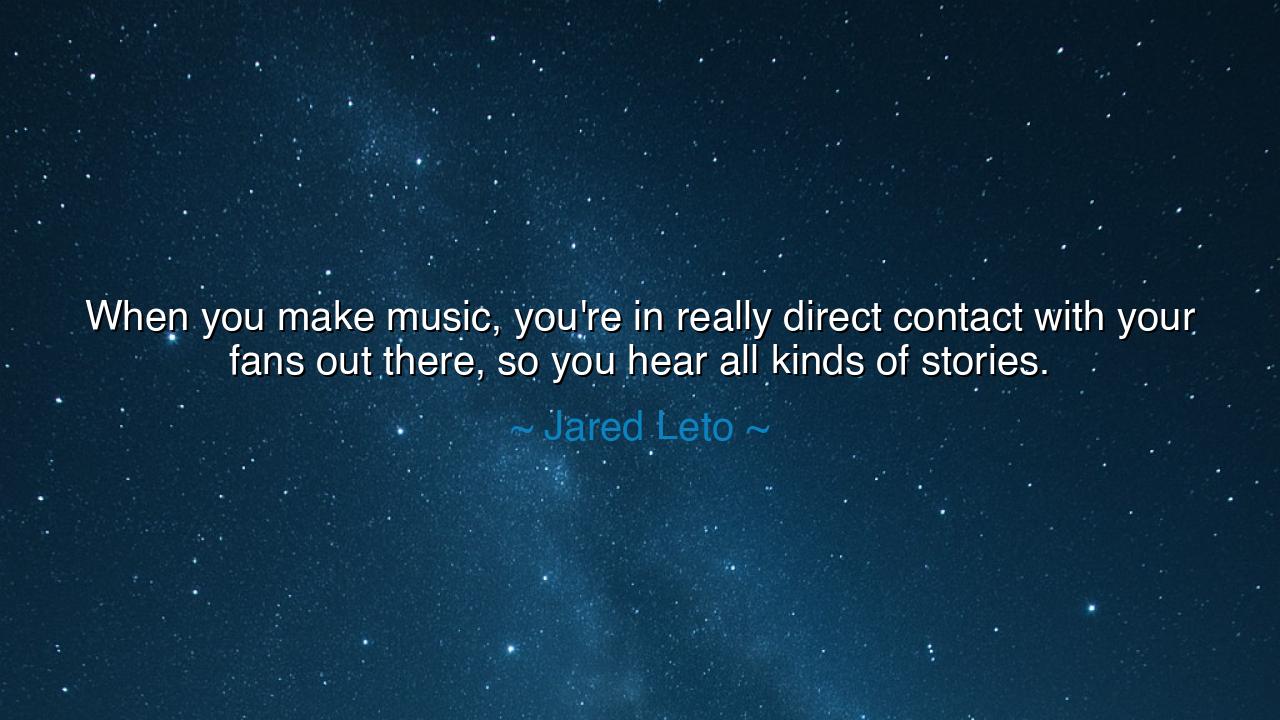
When you make music, you're in really direct contact with your
When you make music, you're in really direct contact with your fans out there, so you hear all kinds of stories.






The artist and seeker Jared Leto once said: “When you make music, you're in really direct contact with your fans out there, so you hear all kinds of stories.” This statement is not merely about performance, but about the sacred exchange between the creator and those who receive. For music is not a one-way offering, like water poured into an empty vessel. It is a river that flows both ways, carrying not only the artist’s voice but also the voices of those who listen. In this exchange, the musician learns that every song is a mirror, reflecting the lives, struggles, and hopes of countless others.
The ancients understood that the bard, the minstrel, the poet, was never merely a singer of songs. He was a gatherer of the people’s spirit, a vessel for their stories. When a troubadour traveled from village to village, he carried with him the tales of the people, weaving them into verse so that their voices might be remembered. So too does Leto remind us: the musician is in direct contact with the people, not through contracts or screens, but through the raw energy of sound and soul. And from this contact emerges a wealth of stories, each one carrying the pulse of human life.
Consider the example of Woody Guthrie, the wandering voice of America during the Great Depression. He sang to the poor, the displaced, the forgotten. His songs were born from their stories—the dust storms, the lost farms, the endless search for dignity. When people heard him, they did not hear only Guthrie’s voice; they heard their own lives given shape and meaning. This is the power Jared Leto speaks of: the artist listens as much as he creates, and in that listening, the people’s stories become immortal.
Leto himself, performing with his band Thirty Seconds to Mars, has heard these confessions firsthand. Fans have spoken to him of how a lyric saved them from despair, how a melody gave them courage to continue living. In such moments, the boundary between artist and listener dissolves. The music ceases to be a product; it becomes a bridge, carrying human hearts across distances of pain and isolation. It is this intimacy, this communion of story and sound, that reveals the true power of art.
The teaching here is profound: creation is also listening. Whether in music, in writing, or in any form of art, the creator is not a solitary tower, but a part of a greater chorus. The stories of others flow into him, shaping his work, and his work in turn gives those stories voice. This exchange is not limited to musicians—it is a principle of life itself. To connect deeply with others, one must both speak and hear, both give and receive.
For us, the lesson is this: in every act of communication, remember the sacred balance. Do not merely speak; listen for the stories that others carry. In your work, your friendships, your family, strive to be both a voice and an ear. For when you open yourself to the lives of others, your own work—whether song, craft, or deed—will carry greater depth, greater truth.
Practically, this means cultivating moments to listen. Ask the people around you about their journeys, their struggles, their joys. Let their stories enrich you. And when you create—be it music, words, or simple acts of kindness—let those stories live through your actions. In this way, your work becomes more than your own; it becomes a shared song of humanity.
Thus, let Jared Leto’s words remind us: music is direct contact, and in that contact lie the stories of countless lives. To create is to connect, to connect is to listen, and to listen is to honor the spirit of others. If you would live fully, then live as both singer and listener, carrying forward not only your own voice, but the chorus of humanity that surrounds you.






AAdministratorAdministrator
Welcome, honored guests. Please leave a comment, we will respond soon